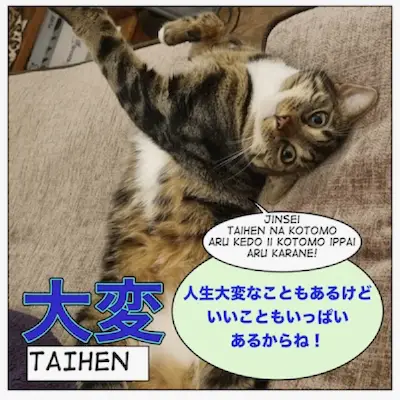
「人生大変なこともあるけど楽しいこともいっぱいあるからね。」
= じんせいたいへんなこともあるけどたのしいこともいっぱいあるからね。
= Jinsei taihenna kotomo aru kedo tanoshii kotomo ippai aru kara ne.
= Life has tough moments, but there are fun moments too.
Hello again, everyone! I’m your guest teacher, Gizmo.
We are going to learn the word 大変 ( =たいへん = taihen) in this lesson. It’s VERY common and useful in daily conversation! It does have a few different meaning, however. But don’t worry! I’ll give you example sentences for each use so you’ll be able to use it confidently.
Here we go!!
1) very/ extremely (formal)
🔸Common patterns:
* 大変 ( = たいへん = taihen ) + phrase
* 大変 ( = たいへん = taihen )+ adverb ~に (=ni) + verb
*大変 ( = たいへん = taihen )+ adjective (i-adjective い (=i) /na-adjective な (=
na)) + noun
* 大変 ( = たいへん = taihen )+ adjective (i-adjective く ( = ku) /na-adjective に( = ni))+ verb
* 大変 ( = たいへん = taihen )+ adjective (i-adjective い(= i)/na-adjective な( = na))+ です(= desu) /(casual) だ( = da), (past tense) でした (=deshita) /(casual) だった (=datta)
📝 You only use 大変 ( = たいへん ) in formal writing or speech, for example when writing to or speaking with a customer or client, to show respect and consideration in business situations.
Ex. 大変申し訳ございませんでした。
= たいへんもうしわけございませんでした。
= Taihen moushiwake gozaimasen deshita.
= I/We sincerely/deeply apologize.
Ex. A: 「もしよかったら知っている業者を紹介しますよ。」
= もしよかったらしっているぎょうしゃをしょうかいしますよ。
= Moshi yokattara shitteiru gyousha wo shoukai shimasu yo.
= If you’d like, I can introduce a contractor I know.
B: 「大変ありがたいお話ですが今回は自分達でやってみようと思います。」
= たいへんありがたいおはなしですがこんかいはじぶんたちでやってみようとおもいます 。
= Taihen arigatai ohanashi desu ga konkai wa jibuntachi de yatte miyou to omoimasu.
= That’s very kind of you, but this time we’ll try doing it ourselves.
Ex. 私達の努力が認められたことを大変嬉しく思っております。
= わたしたちのどりょくがみとめられたことをたいへんうれしくおもっております。
= Watashitachi no doryoku ga mitomerareta koto wo taihen ureshiku omotte orimasu.
= We are very pleased that our efforts have been recognized.
Ex. 日頃より大変お世話になっております。
= ひごろよりたいへんおせわになっております。
= Higorot yori taihen osewa ni natte orimasu.
= Thank you very much for your continued support.
Ex. 大変恐縮ではございますがスケジュールの変更をお願いできますでしょうか。
= たいへんきょうしゅくではございますがスケジュールのへんこうをおねがいできますでしょうか。
= Taihen kyoushuku dewa gozaimasuga sukejuuru no henkou wo onegai dekimasu deshouka.
= I’m very sorry to trouble you, but may I ask to reschedule?
Ex. 大変丁寧に説明してもらえました。
= たいへんていねいにせつめいしてもらえました。
= Taihen teinei ni setsumei shite moraemashita.
= I received a very thorough explanation.
Ex. 大変光栄なことではございますが今回は辞退させていただきます。
= たいへんこうえいなことではございますがこんかいはじたいさせていただきます。
= Taihen koueina koto dewa gozaimasuga konkai wa jitai sasete itadakimasu.
= It is a great honor, but I must decline this time.
Ex. 大変悲しい事件が起きました。
= たいへんかなしいじけんがおきました。
= Taihen kanashii jiken ga okimashita.
= A very tragic incident has occurred.
Ex. これは、大変難しい問題だと思います。
= これは、たいへんむずかしいもんだいだとおもいます。
= Korewa, taihen muzukashii mondai dato onmoimasu.
= I think this is a very difficult problem.
Ex. 大変役に立つ情報を頂きありがとうございました。
= たいへんやくにたつじょうほうをいただきありがとうございました。
= Taihen yaku ni tatsu jouhou wo itadaki arigatou gozaimashita.
= Thank you very much for the extremely useful information.
Ex. 今お買い求めいただきますと大変お得な価格となっております。
= いまおかいもとめいただきますとたいへんおとくなかかくとなっております。
= Ima okaimotome itadakimasu to taihen otokuna kakaku to natte orimasu.
= If you make a purchase now, it will be at a very good price.
Ex. 大変お待たせいたしました。ショーの始まりです。
= たいへんおまたせいたしました。ショーのはじまりです。
= Taihen omatase itashimashita. Shoo no hajimari desu.
= Thank you very much for waiting. The show is about to begin.
Ex. 鉄板が大変熱くなっておりますのでお気をつけてお召し上がりください。
= てっぱんがたいへんあつくなっておりますのでおきをつけておめしあがりください。
= Teppan ga taihen atsuku natte orimasu node okiwotukete omeshiagari kudasai.
= The iron plate is extremely hot, so please be careful when eating.
Ex. (天気予報)しばらく大変厳しい暑さが続くでしょう。
= (てんきよほう)しばらくたいへんきびしいあつさがつづくでしょう。
= (Tenkiyohou) Shibaraku taihen kibishii atsusa ga tsuzuku deshou.
= (Weather forecast) Extremely severe heat will continue for a while.
Ex. 全部合わせると大変高い買い物になった。
= ぜんぶあわせるとたいへんたかいかいものになった。
= Zenbu awaseru to taihen takai kamono ni natta.
= Altogether, it turned out to be a very expensive purchase.
Ex. この作文は大変よく書けていましたよ。
= このさくぶんはたいへんよくかけていましたよ。
= Kono sakubun wa taihen yoku kakete imashita yo.
= (Literal) This composition was written extremely well.
→You wrote this composition very well.
Ex. 大変よくできました。
= たいへんよくできました。
= Taihen yoku dekimashita.
= Excellent work! / Great job! / Very well done!
📝 You might have seen the emoji of a cherry blossom with 「大変よくできました =たいへんよくできました =Taihen yoku dekimashita」 written inside. 💮

Some teachers use this stamp or sticker when children do well on their homework assignments, quizzes, or tests.
***
大変 ( = たいへん = taihen ) as used above in 1) is used in formal writing or speech, but you can use also use 大変 ( = たいへん = taihen ) in daily conversation like in the following usages: (2, 3, 4, 5).
⬇️
2) serious problem / disaster (negative)
It is used in a negative context
🔸Common patterns:
* 大変な ( = たいへん = taihenna) + noun
* 大変 ( = たいへん = taihen )+ です( = desu) /(casual) だ ( = da) , (past tense) でした ( = deshita) /(casual) だった ( = datta)
Ex. 大変なことが起こった。
= たいへんなことがおこった。
= Taihenna koto ga okotta.
= Something serious happened.
Ex. 大変なミスを犯してしまった。
= たいへんなミスをおかしてしまった。
= Taihenna misu wo okashite shimatta.
= I’ve made a terrible mistake.
Ex. マギー先生を怒らせて大変な目に遭った。😨
= マギーせんせいをおこらせてたいへんなめにあった。
= Maggie Sensei wo okorasete taihenna me ni atta.
= I got into big trouble for making Maggie Sensei angry.
📝 大変な目に遭う = たいへんなめにあう = taihenna me ni au = to have a really hard time
Ex. 新幹線が2時間も止まって大変だった。
= しんかんせんがにじかんもとまってたいへんだった。
= Shinkansen ga nijikan mo tomatte taihen datta.
= The Shinkansen was stopped, and I was stuck for two hours. It was awful.
Ex. A: 「空港でパスポートの期限が切れていることに気がついたんです。」
= くうこうでパスポートのきげんがきれていることにきがついたんです。
= Kuukou de pasupooto no kigen ga kirete iru koto ni kigatsuitan desu.
= I realized my passport had expired at the airport.
Ex. B: 「それは大変でしたね。」
= それはたいへんでしたね。
= Sore wa taihen deshita ne.
= That must have been terrible. / Oh no! That’s terrible. (I bet you had a really tough time.)
3) A lot of work / hardship / tough/ pain
Ex. 育児が大変だ。
= いくじがたいへんだ。
= Ikuji ga taihen da.
= Raising children is hard work.
Ex. 今、仕事が大変で週末も働かなければいけない。
= いま、しごとがたいへんでしゅうまつもはたらかなければいけない。
= Ima, shigoto ga taihen de shuumatsu mo hatarakanakereba ikenai.
= Work is really tough right now, and I have to work on the weekend too.
Ex. 来月から転勤なんだ。引越しが大変!
= らいげつからてんきんなんだ。ひっこしがたいへん!
= Raigetsu kara tenkin nanda. Hikkoushi gataihen .
= I’m being transferred next month. Moving will be tough!
Ex. 家から1時間半もかけて会社に行くのは大変だね。
= いえからいちじかんはんもかけてかいしゃにいくのはたいへんだね。
= Ie kara ichijikan-han mo kakete kaisha ni iku no wa taihen dane.
= It is tough to commute an hour and a half to work from home, isn’t it?
Ex. 一人暮らしは大変だけどがんばって。
= ひとりぐらしはたいへんだけどがんばって。
= Hitorigurashi wa taihen dakedo ganbatte ne.
= Living alone is tough, but hang in there.
Ex. 大変な中、お返事ありがとうございます。
= たいへんななか、おへんじありがとうございます。
= Taihenna naka, ohenji arigatou gozaimasu.
= Thank you for replying despite your difficult situation.
Ex. 毎日、朝6時に起きて家事をしてから仕事に行くのは大変なことですね。
= まいにち、あさろくじにおきてかじをしてからしごとにいくのはたいへんなことですね。
= Mainichi, asa rokuji ni okite kaji wo shite kara shigoto ni iku nowa taihenna koto desune.
= You wake up at 6 every morning, do housework, and then go to work ― that’s a lot to handle.
Ex. A: 「姉が離婚して実家に帰ってきたんだ。」
= あねがりこんしてじっかにかえってきたんだ。
= Ane ga rikon shite jikka ni kaete kitanda.
= My older sister got divorced and came back to our parents’ house.
Ex. B: 「何かと大変ですね。」
= なにかとたいへんですね。
= Nanika to taihen desu ne.
= You’ve been through a lot.
You can use these expressions to show sympathy for someone going through a hard time or a busy period.
→ 大変だね。
= たいへんだね。
= Taihen dane.
= That’s tough./That must be tough./That’s a pain.
→大変そうだね。
= たいへんそうだね。
= Taihensou dane.
= That looks/sounds tough.
Ex. マギー先生も大変なんですね。
= マギーせんせいもたいへんなんですね。
= Maggie Sensei mo taihennan desu ne.
= You’ve been through a lot too, Maggie Sensei.
4) important / a big deal / a big news / impressive
* 大変なこと ( = たいへんなこと = taihenna koto) can also be used in a positive meaning to describe something important, impressive, or a big deal.
Ex. A: 「私の絵がコンテストで優勝したの。」 (female speech)
= わたしのえがコンテストでゆうしょうしたの。
= Watashi no e ga kontesuto de yuushou shitano.
= My painting won first place in the contest.
B: 「それは大変なことじゃない。」
= それはたいへんなことじゃない。
= Sore wa taihenna koto janai.
= It is a big deal, isn’t it? / That is amazing, isn’t it?
Ex. 日本語能力試験の1級に受かるなんて大変なことだよ!
= にほんごのうりょくしけんのいっきゅうにうかるなんてたいへんなことだよ!
= Nihongo nouryokushiken no ikkyuu ni ukaru nante taihenna koto dayo!
= Passing the JLPT Level 1 is a huge accomplishment! / That’s a big deal!
5) Urgent / Emergency:
大変 ( = たいへん= taihen ) is used to react to danger, emergencies, or sudden problems.
You often say it quickly in conversation, like “Oh no!” in English.
Ex. 大変だ!火事だ!!
= たいへんだ!かじだ!!
= Taihen da! Kaji da!
= Oh no! There’s a fire!!
Ex. 大変!大変!! ニュースすぐに見て!
= たいへん!たいへん!! ニュースすぐにみて!
= Taihe! Taihen!! Nyuusu sugu ni mite!
= Oh no! Oh no!! Watch the news right away!
Ex. 大変だ!財布がない。どこかで落としたみたい。
= たいへんだ!さいふがない。どこかでおとしたみたい。
= Taihen da! Saifu ga nai. Dokoka de otoshita mitai.
= Oh no! My wallet is gone. I think I dropped it somewhere.
📝 The translation could be the same, but if you simply forgot your wallet (not lost it), you would just say しまった! = Shimatta! = “Uh-oh!”
Ex. 大変!もうこんな時間だ。電車に乗り遅れちゃう!
= たいへん!もうこんなじかんだ。でんしゃにのりおくれちゃう!
= Taihen! Mou konna jikan da. Densha ni noriokurechau.
= Oh no! It’s already this late.(Look at the time!) I’m going to miss my train!
Ex. 大変!ぎっくり腰になっちゃった。
= たいへん!ぎっくりごしになっちゃった。
= Taihen! Gikkurigoshi ni nacchatta.
= Oh no! I’ve thrown out my back!

***
 マギー先生より = Maggie Sensei yori = From Maggie Sensei
マギー先生より = Maggie Sensei yori = From Maggie Sensei
ギズモ先生、ありがとう!
= Gizmo Sensei, arigatou!
= Thank you, Gizmo Sensei
あっ!大変!もうおやつの時間だ。じゃあ、皆さん、この辺で。👋
= あっ!たいへん!もうおやつのじかんだ。じゃあ、みなさん、このへんで。
= Ah! Taihen! Mou oyatsu no jikan da. Jaa, minasan, kono hen de.
= Oh no! It’s snack time already. Alright everyone, let’s wrap it up here, OK?
****
My Patrons can access the audio file
Audio Files for this lesson →Click here
PDF file without ads (One with romaji & One without romaji) →Click here
I appreciate your support! サポートありがとう! !
My supporters can access tons of audio files, PDF files, and special lessons on my Patreon page.
❤️ありがとう x 2: Mini lessons, PDF files with audio for all the lessons here from 2018
❤️ありがとう x 5 In addition to the previous benefit + Daily Japanese
Check the index of Daily Japanese Series →Index
❤️ありがとう x 10 In addition to the previous benefit + PDF file of all my Twitter lessons for a month (average 10 ~ 18 pages) with an audio file. Please check the details here
One-time support ↓ ありがとう!



2 Comments
Thank you! So just for clarification, most times taihenn is used in spoken Japanese its the casual usage? On a different note, I really appreciate all of these lessons, and wanted to give a huge thank you Maggie Sensei.
Hi Kim
Thank you so much for your kind words. ☺️
The word 大変 itself is neutral, so it can be used in both formal and casual spoken Japanese, besides the formal usage I explained in 1).
大変でしたね/大変です! → polite
大変だったね/大変だ! → casual
What changes is the ending and context, not the word 大変 itself.